人教课标版B1 Unit 1 Friendship Grammar课件41张
文档属性
| 名称 | 人教课标版B1 Unit 1 Friendship Grammar课件41张 |  | |
| 格式 | zip | ||
| 文件大小 | 3.7MB | ||
| 资源类型 | 教案 | ||
| 版本资源 | 人教版(新课程标准) | ||
| 科目 | 英语 | ||
| 更新时间 | 2015-09-02 15:43:15 | ||
图片预览


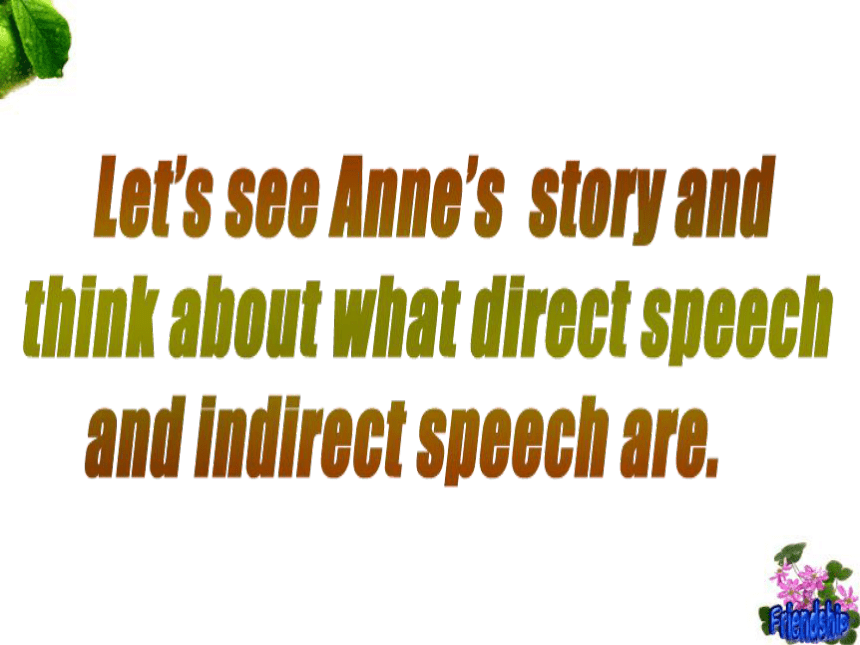
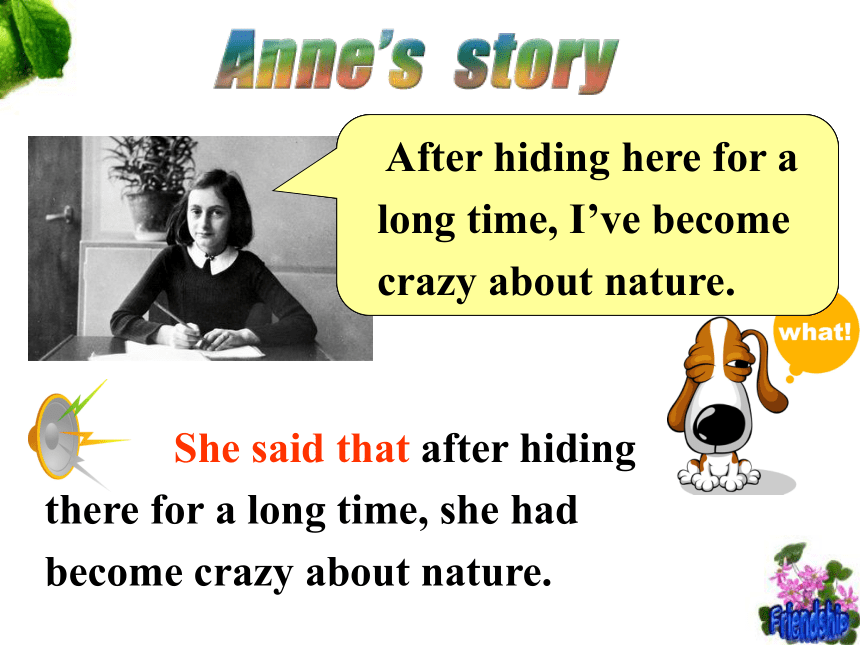
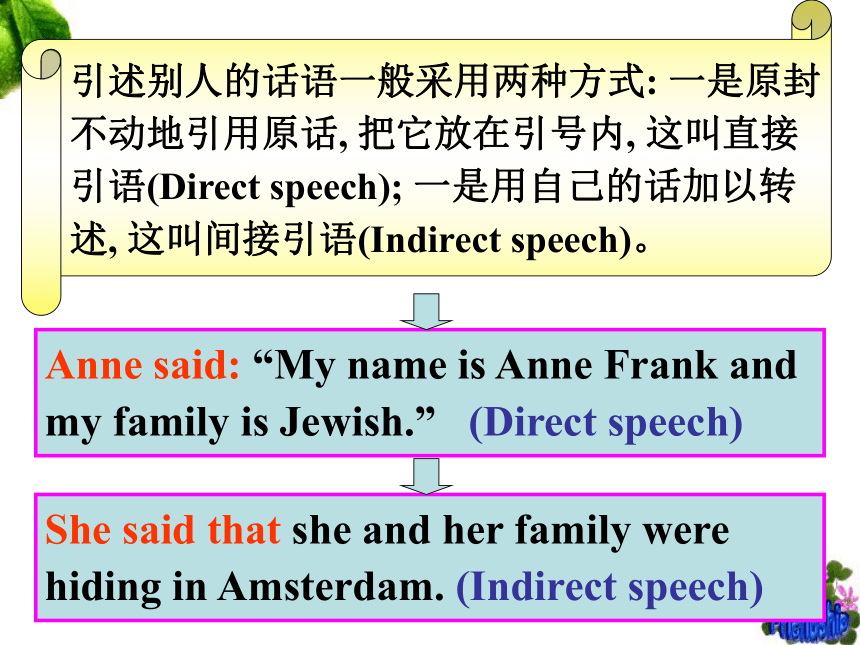

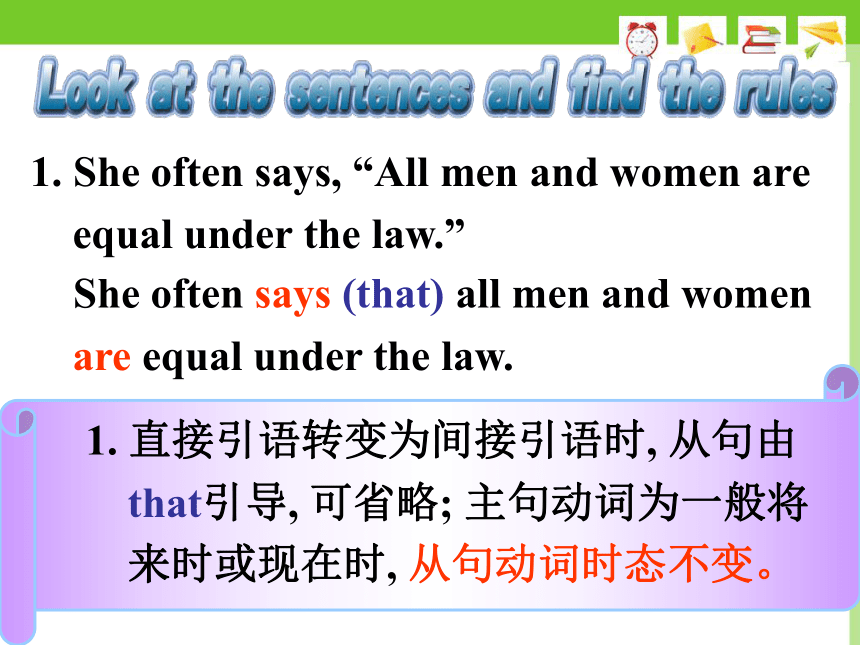
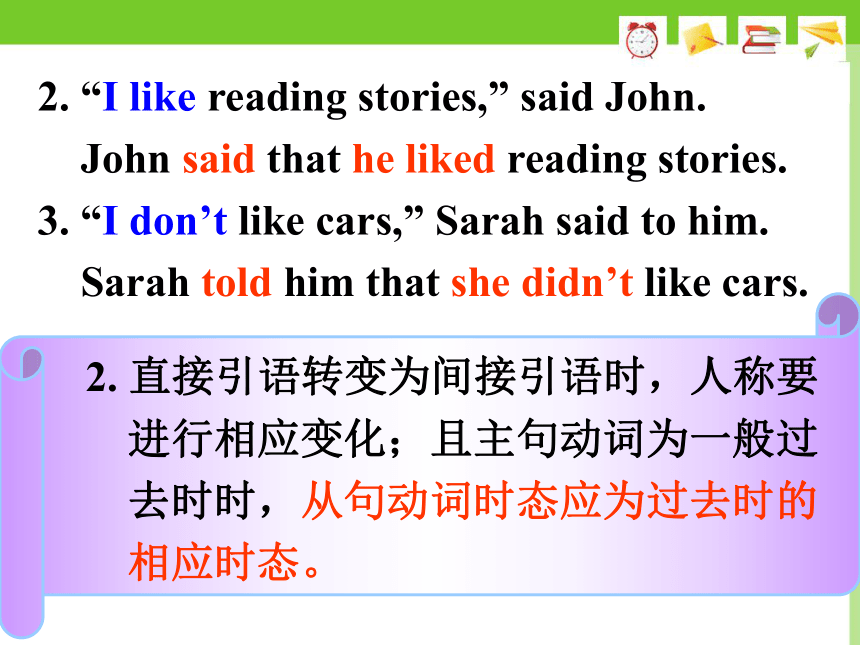
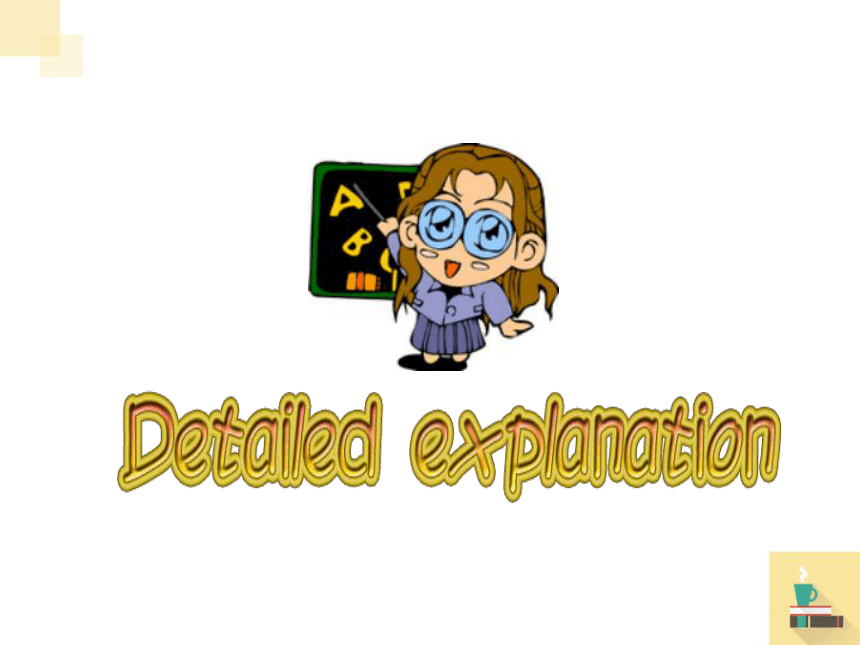
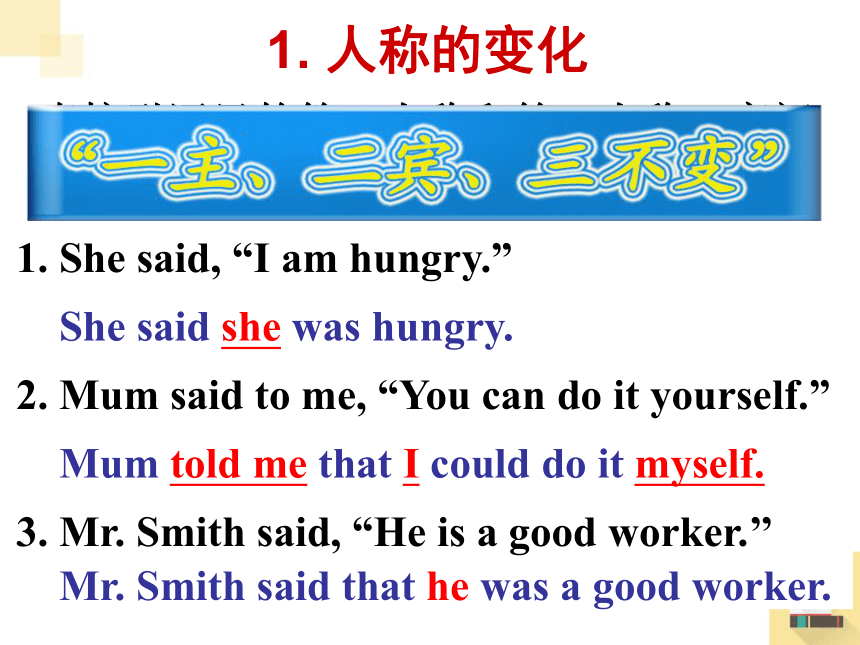
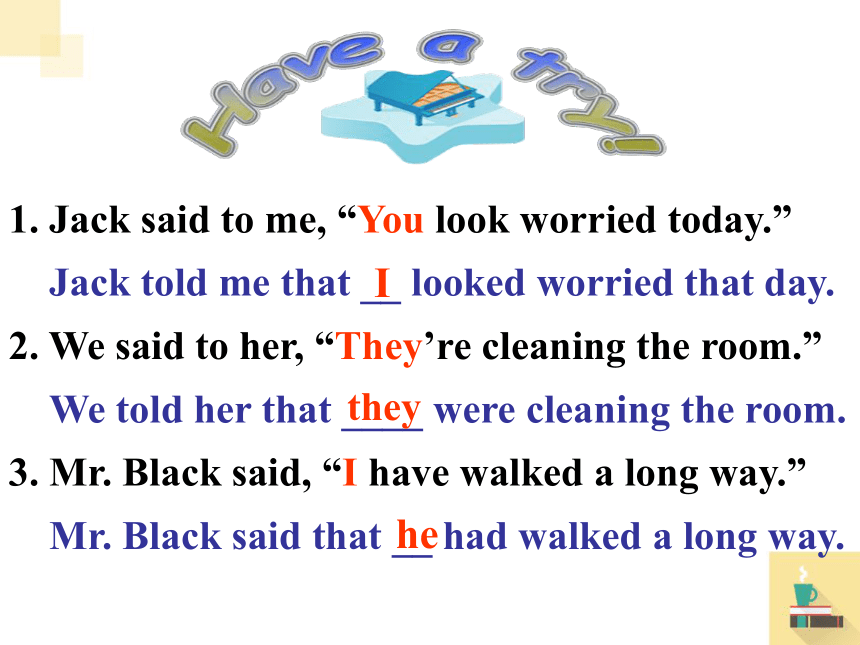
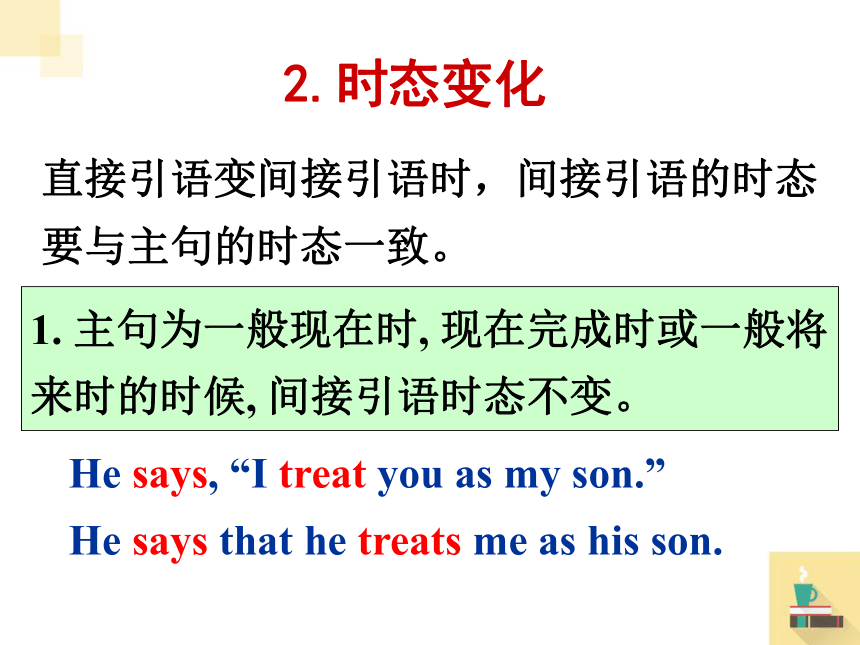
文档简介
课件41张PPT。人教课标
高一 必修 1
Unit 1 She said that her name was Anne Frank and her family was Jewish. My name is Anne Frank and my family is Jewish.
My family and I are hiding in Amsterdam. She said that she and her family were hiding in Amsterdam.
My only true friend is Kitty—my diary. She said that her only true friend was Kitty—her diary.
After hiding here for a long time, I’ve become crazy about nature. She said that after hiding there for a long time, she had become crazy about nature.Anne said: “My name is Anne Frank and my family is Jewish.” (Direct speech)She said that she and her family were hiding in Amsterdam. (Indirect speech)引述别人的话语一般采用两种方式: 一是原封
不动地引用原话, 把它放在引号内, 这叫直接
引语(Direct speech); 一是用自己的话加以转
述, 这叫间接引语(Indirect speech)。1. She often says, “All men and women are equal under the law.” She often says (that) all men and women are equal under the law.2. “I like reading stories,” said John.
John said that he liked reading stories.
3. “I don’t like cars,” Sarah said to him.
Sarah told him that she didn’t like cars. 直接引语里的第一人称和第二人称,变间
接引语时,人称要做相应调整。
1. She said, “I am hungry.”
She said she was hungry.
2. Mum said to me, “You can do it yourself.”
Mum told me that I could do it myself.
3. Mr. Smith said, “He is a good worker.’’
Mr. Smith said that he was a good worker. 1. 人称的变化1. Jack said to me, “You look worried today.”
Jack told me that __ looked worried that day.
2. We said to her, “They’re cleaning the room.”
We told her that ____ were cleaning the room.
3. Mr. Black said, “I have walked a long way.”
Mr. Black said that __ had walked a long way. I theyhe2.时态变化?? 直接引语变间接引语时,间接引语的时态要与主句的时态一致。 He says, “I treat you as my son.”
He says that he treats me as his son.1. 主句为一般现在时, 现在完成时或一般将来时的时候, 间接引语时态不变。一般现在时
“I know it,” he said.一般过去时
He said he knew it. 2. 当主句为过去时, 从句要跟着相应的变化。 现在进行时
“I’m making coffee for you all,” she said.过去进行时
She said she was making coffee for us all. 现在完成时
“I have seen her before,” said he. 过去完成时
He said he had seen her before. 现在完成进行时
He said, “I have been doing it for hours.”过去完成进行时
He said he had been doing it for hours. 一般过去时
“I saw her last Monday,” he said.过去完成时
He said he had seen her the previous Monday. 过去进行时
“I was waiting for Jim,” she said. 过去完成进行时
She said she had been waiting for Jim.一般将来时
He said: “We shall start tomorrow.”过去将来时
He said they would start the next day.过去完成时
“Rick had been ill for many days till he died.” Jack said.过去完成时
Jack said Rick had been ill for many days till he died. 一般现在时
现在完成时
现在进行时
一般将来时
一般过去时一般过去时
过去完成时
过去进行时
过去将来时
过去完成时过去完成时
过去进行时不变1. “It is really cold,” she said to me.
She told me that it ____ really cold.was2. “I don’t want to go there with Alice,” said Tom.
Tom said that he ______ want to go there with Alice.didn’t3. The boy said, “I will be a pilot.”
The boy said that he ________ a pilot.”would be4. Tom said, “We are listening to music.”
Tom said that they ______________ music.? were listening to5. Mike said, “I have finished my homework.”
Mike said ______________ his homework.he had finished 直接引语 间接引语时 间 状 语 now
today
this week
yesterday
last week
four days ago
tomorrow
next month
the day after tomorrow
the day before yesterdaythen
that day
that week
the day before
the week before
four days before
the next day
the next month
in two days’ time
two days before3.其他变化?? 直接引语 间接引语指示代词 地点状语 方向性动词 this that these those here there come go bring take They asked, “Is it easy to solve the problem?”They askedif / whetherit is easy to solve the problem wasThey asked if it was easy to solve the problem.He asked, “When do you harvest the wheat?”He askedwhenyou harvest the wheat.we harvestedThey asked when we harvested the wheat.1. “I don’t know the address of my new home,” said Anne. Anne said that she didn’t know the address of her new home.2. “I’ve got tired of looking at nature through dirty curtains and dusty windows,” Anne said to her father. Anne told her father that she had got tired of looking at nature through dirty curtains and dusty windows.3. “I need to pack up my things in the suitcase very quickly,” the girl said.
4. “Why did you choose your diary and old letters?” her father asked her. The girl said that she needed to pack up her things in the suitcase very quickly. Her father asked her why she chose / had chosen her diary and old letters.5. Mother asked her if/whether she was very hot with so many clothes on.
6. Margot asked her what else she had hidden under her overcoat. “Are you very hot with so many clothes on?” Mother asked/said to her. “What else have you hidden under your overcoat?” Margot asked her.7. Anne asked her father when they would go back home.
8. Father asked Anne why she had talked so much to that boy. “When shall we go back home?” Anne asked her father. “Why did you talk so much to that boy?” Father asked Anne. 由直接引语转变为间接引语,下列情况时态不变:→ The teacher said that water freezes when the temperature falls below 0℃. The teacher said, “Water freezes when the temperature falls below 0℃.” 1. 不变的真理2. 经常的习惯: He said to the doctor, “I smoke two packs every day.”→ He told the doctor that he smokes two packs every day.3. 直接引语为一般过去时并且与具体时间状语连用: The teacher said, “The baby was born in 2010.” → The teacher said the baby was born in 2010.4. 部分情态动词, 如: must, ought to, used to, had better 等。
She said to me, “You must hurry up.”
→ She said that I must hurry up.如果在当地转述, here 不必改为 there, 动词 come 不必改为 go。如果在当天转述, yesterday/tomorrow 等时间状语也不必改变。A: You needn’t come here tomorrow.
B: What did she say?
C: She said that you needn’t come here
tomorrow.1. The teacher asked the girl, “Why are
you crying here?”
The teacher asked the girl ____ ___ ____ crying _____.
2. “When will the plane take off?” I wondered.
I wondered _____ ___ _____ _____ ____ ___. why she
wastherewhen the plane would takeoff 3. “Have you seen our plane yourself?” he asked the boy.
He asked the boy _______ __ ___ ____ _____ plane _______.
whether he hadseen their himself4. The teacher asked her, “Does the sun rise in the east?”
The teacher asked her ________ the sun _____ in the east.whetherrisesReview the rules of direct
speech and indirect speech.
高一 必修 1
Unit 1 She said that her name was Anne Frank and her family was Jewish. My name is Anne Frank and my family is Jewish.
My family and I are hiding in Amsterdam. She said that she and her family were hiding in Amsterdam.
My only true friend is Kitty—my diary. She said that her only true friend was Kitty—her diary.
After hiding here for a long time, I’ve become crazy about nature. She said that after hiding there for a long time, she had become crazy about nature.Anne said: “My name is Anne Frank and my family is Jewish.” (Direct speech)She said that she and her family were hiding in Amsterdam. (Indirect speech)引述别人的话语一般采用两种方式: 一是原封
不动地引用原话, 把它放在引号内, 这叫直接
引语(Direct speech); 一是用自己的话加以转
述, 这叫间接引语(Indirect speech)。1. She often says, “All men and women are equal under the law.” She often says (that) all men and women are equal under the law.2. “I like reading stories,” said John.
John said that he liked reading stories.
3. “I don’t like cars,” Sarah said to him.
Sarah told him that she didn’t like cars. 直接引语里的第一人称和第二人称,变间
接引语时,人称要做相应调整。
1. She said, “I am hungry.”
She said she was hungry.
2. Mum said to me, “You can do it yourself.”
Mum told me that I could do it myself.
3. Mr. Smith said, “He is a good worker.’’
Mr. Smith said that he was a good worker. 1. 人称的变化1. Jack said to me, “You look worried today.”
Jack told me that __ looked worried that day.
2. We said to her, “They’re cleaning the room.”
We told her that ____ were cleaning the room.
3. Mr. Black said, “I have walked a long way.”
Mr. Black said that __ had walked a long way. I theyhe2.时态变化?? 直接引语变间接引语时,间接引语的时态要与主句的时态一致。 He says, “I treat you as my son.”
He says that he treats me as his son.1. 主句为一般现在时, 现在完成时或一般将来时的时候, 间接引语时态不变。一般现在时
“I know it,” he said.一般过去时
He said he knew it. 2. 当主句为过去时, 从句要跟着相应的变化。 现在进行时
“I’m making coffee for you all,” she said.过去进行时
She said she was making coffee for us all. 现在完成时
“I have seen her before,” said he. 过去完成时
He said he had seen her before. 现在完成进行时
He said, “I have been doing it for hours.”过去完成进行时
He said he had been doing it for hours. 一般过去时
“I saw her last Monday,” he said.过去完成时
He said he had seen her the previous Monday. 过去进行时
“I was waiting for Jim,” she said. 过去完成进行时
She said she had been waiting for Jim.一般将来时
He said: “We shall start tomorrow.”过去将来时
He said they would start the next day.过去完成时
“Rick had been ill for many days till he died.” Jack said.过去完成时
Jack said Rick had been ill for many days till he died. 一般现在时
现在完成时
现在进行时
一般将来时
一般过去时一般过去时
过去完成时
过去进行时
过去将来时
过去完成时过去完成时
过去进行时不变1. “It is really cold,” she said to me.
She told me that it ____ really cold.was2. “I don’t want to go there with Alice,” said Tom.
Tom said that he ______ want to go there with Alice.didn’t3. The boy said, “I will be a pilot.”
The boy said that he ________ a pilot.”would be4. Tom said, “We are listening to music.”
Tom said that they ______________ music.? were listening to5. Mike said, “I have finished my homework.”
Mike said ______________ his homework.he had finished 直接引语 间接引语时 间 状 语 now
today
this week
yesterday
last week
four days ago
tomorrow
next month
the day after tomorrow
the day before yesterdaythen
that day
that week
the day before
the week before
four days before
the next day
the next month
in two days’ time
two days before3.其他变化?? 直接引语 间接引语指示代词 地点状语 方向性动词 this that these those here there come go bring take They asked, “Is it easy to solve the problem?”They askedif / whetherit is easy to solve the problem wasThey asked if it was easy to solve the problem.He asked, “When do you harvest the wheat?”He askedwhenyou harvest the wheat.we harvestedThey asked when we harvested the wheat.1. “I don’t know the address of my new home,” said Anne. Anne said that she didn’t know the address of her new home.2. “I’ve got tired of looking at nature through dirty curtains and dusty windows,” Anne said to her father. Anne told her father that she had got tired of looking at nature through dirty curtains and dusty windows.3. “I need to pack up my things in the suitcase very quickly,” the girl said.
4. “Why did you choose your diary and old letters?” her father asked her. The girl said that she needed to pack up her things in the suitcase very quickly. Her father asked her why she chose / had chosen her diary and old letters.5. Mother asked her if/whether she was very hot with so many clothes on.
6. Margot asked her what else she had hidden under her overcoat. “Are you very hot with so many clothes on?” Mother asked/said to her. “What else have you hidden under your overcoat?” Margot asked her.7. Anne asked her father when they would go back home.
8. Father asked Anne why she had talked so much to that boy. “When shall we go back home?” Anne asked her father. “Why did you talk so much to that boy?” Father asked Anne. 由直接引语转变为间接引语,下列情况时态不变:→ The teacher said that water freezes when the temperature falls below 0℃. The teacher said, “Water freezes when the temperature falls below 0℃.” 1. 不变的真理2. 经常的习惯: He said to the doctor, “I smoke two packs every day.”→ He told the doctor that he smokes two packs every day.3. 直接引语为一般过去时并且与具体时间状语连用: The teacher said, “The baby was born in 2010.” → The teacher said the baby was born in 2010.4. 部分情态动词, 如: must, ought to, used to, had better 等。
She said to me, “You must hurry up.”
→ She said that I must hurry up.如果在当地转述, here 不必改为 there, 动词 come 不必改为 go。如果在当天转述, yesterday/tomorrow 等时间状语也不必改变。A: You needn’t come here tomorrow.
B: What did she say?
C: She said that you needn’t come here
tomorrow.1. The teacher asked the girl, “Why are
you crying here?”
The teacher asked the girl ____ ___ ____ crying _____.
2. “When will the plane take off?” I wondered.
I wondered _____ ___ _____ _____ ____ ___. why she
wastherewhen the plane would takeoff 3. “Have you seen our plane yourself?” he asked the boy.
He asked the boy _______ __ ___ ____ _____ plane _______.
whether he hadseen their himself4. The teacher asked her, “Does the sun rise in the east?”
The teacher asked her ________ the sun _____ in the east.whetherrisesReview the rules of direct
speech and indirect speech.
